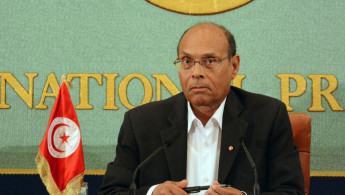Former Tunisian president Marzouki accuses Algeria of causing Rabat-Tunis diplomatic rift
Tunisia's former president Moncef Marzouki accused Algerian authorities of being behind Rabat-Tunis' 'catastrophic ties' as the two states are facing an unprecedented diplomatic crisis.
"Saied fell to the Algerian narrative on the creation of a sixth state in the Maghreb, thus breaking the line of neutrality followed by Tunisia, for decades, concerning the conflict between Morocco and Algeria," Marzouki, who lives in France, said to Paris-based channel Canal 24 last week.
Since the start of the Algerian-Moroccan feud over Western Sahara four decades ago, Tunisia maintained a neutral position over the dispute. That changed with Tunisian President Kais Saied's decision last August to personally welcome Brahim Ghali, the leader of the separatist movement Polisario Front and Rabat's main enemy, at Tunis.
Ghali was invited to the Japanese-African investment conference TICAD, which took place in the Tunisian capital from 27 to 28 August 2022.
At the time, Morocco reacted furiously to Tunis' "hostile" and "unnecessarily provocative act" by immediately withdrawing its Tunis ambassador for consultations and cancelling its participation in the high-profile conference.
The 'bromance' between Saied and Ghali at Carthage airport in Tunis coincided with the reconciliation of Tunisia and Algeria following two years of a diplomatic stalemate.
Experts speculate that the price Tunisia has paid to win back Algiers' support was siding with its pro-Polisario position.
However, Moroccan political analyst Said Sadikki argues that Tunisia's neutrality shift vis-a-vis Western Sahara was merely a personal decision from Saied, who seeks to rally more support in the region amid rising opposition against his controversial rule.
"Saied's hosting of Ghali will not change Tunisia's position on the conflict. Tunisia will always stick to neutrality because it's not in its interest to wade into that conflict," he added in an interview with The New Arab.
In an interview with the Qatari channel Al-Jazeera last month, Algerian President Abdelmadjid Tebboune argued that "things are more complicated" in Tunisia since hosting the Polisario leader.
"Since then, Tunisia has been targeted by a plot. We will never abandon Tunisia," he added.
In his latest interview, Merzouki, a vigorous critic of Saied, argued that the statements of the Algerian regime, which he labelled as a "dictatorship", are "completely false" and will lead to "the implosion of the Arab Maghreb Union (UMA)."
In 1989, Morocco, Algeria, Tunisia, Libya and Mauritania established the UMA - a unique moment in the history of the Maghreb, a region tarnished with conflicts since its independence.
Over the next few years, several ministerial meetings were held to discuss further economic and political collaboration in the region, with a combined population of 100 million. In major airports of the five states, a separate queue was assigned to UMA citizens.
However, the dream soon faded as regional disputes became more potent than the Maghreb's aspiration of unity.





 Follow the Middle East's top stories in English at The New Arab on Google News
Follow the Middle East's top stories in English at The New Arab on Google News


